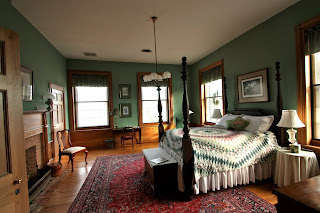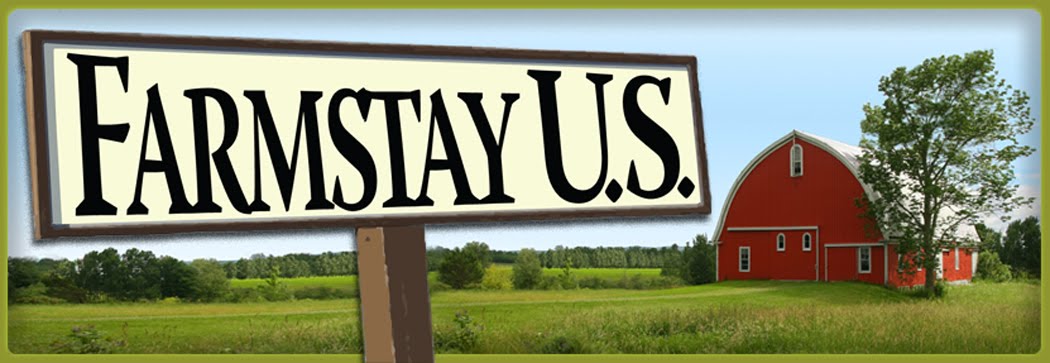To see part I of my Smithfield Farm/Smith Meadows Meats write up, click here. A quick refresher: Smithfield Farm is an eighth generation farm near Berryville, VA. Ruth Smith Pritchard is innkeeper for the farm’s bed and breakfast. Ruth’s two children and their families, including two grandsons, also live on the farm.
Ruth credits her children, Forrest Pritchard and Betsy Pritchard, for bringing Smithfield Farm back into profitable production by embracing grass-based livestock farming and direct marketing. Neither Forrest or Betsy has a background in agriculture -- Betsy has a nursing degree, while Forrest studied creative writing and geology. Ruth says, considering the non-conventional way they run the farm, “it might be good that they didn’t study agriculture.”
Ruth never wanted to push the farm on her children, but she secretly hoped that they would come back to continue the Smithfield legacy. She is delighted that they did. Each of Ruth’s two children has a son, so she hopes that they’ll carry on the farm for generations to come.
When Ruth’s father farmed Smithfield, he sold his crops wholesale. Now most Smithfield products are sold direct to consumers in the DC area at nine farmers markets. Forrest and Betsy also sell to co-op grocery stores in Takoma Park and Laurel, MD, and to a handful of restaurants in DC. An upcoming “mobile kitchen” will expand their farmers market offerings to include hot prepared foods like burgers, sausage sandwiches, pastas with home cooked sauces, and stews, all made with products from the farm and their farmers market friends.
At any given time, the farm is home to 100-200 cattle, 50-75 sheep, 50 pigs, and 750 chickens. All of the animals are raised without hormones or antibiotics, and graze freely in the farm’s pastures. The livestock’s ultimate destination is a Mennonite butcher in Hagerstown, MD but throughout the animals’ lives the Pritchards strive to treat them humanely. Even when they take livestock to slaughter, the Pritchards are careful to stay quiet and respectful, and they don’t use electric prods.
Poultry is processed on the farm in a facility the Pritchards built onto their main working barn. Processing poultry on the farm, while a difficult and demanding job that involves most everyone working on the farm, greatly improves the profitability of raising pastured poultry. The Pritchards process 100-150 three to four pound chickens every two to three weeks. In Virginia, farms can legally process up to 10,000 of their own chickens a year, but all other animals must be processed at a USDA-certified butcher.
Every week, hundreds of boxes of pasta using the farm’s eggs are also made at Smithfield, thanks to a pasta business that Forrest’s wife, Nancy Pritchard, started in 2003. Since then, the Smith Meadows Farm Kitchen has expanded to employ three additional women who help turn Smith Meadows eggs and locally milled flour into fresh ravioli and noodles of over a dozen flavors. Nancy has gone on to spearhead another project, converting the farm’s old pony shed into an artists’ studio called “La Capretta.”
Adjacent to the Smith Meadows Farm Kitchen sits a farm store where drop-by customers can buy handmade Smithfield mugs, locally-roasted coffee, honey from the farm’s hives, and of course eggs and meat. The store is normally unstaffed and operates by honesty policy, although family members can be available to help customers who call in advance.
Smith Meadows meat, eggs, and pasta have a following of farmers market customers who regularly buy the farm’s products because of their great flavor and quality. Many of these customers visit the farm at some point, to take a break from the city and get to know their farmers and their food. Some come to visit the farm store. Others come for bed and breakfast in the elegant 1824 Smithfield manor house. In May, the farm also holds an annual Farm Day, when families are invited to take a walking tour, eat a catered barbeque lunch, see a cooking demonstration, and visit a petting paddock.
When Ruth inherited Smithfield in the 1980s, she decided she would restore the manor house in order to turn Smithfield into a bed and breakfast. The bed and breakfast opened to guests in 1999. Ruth wanted to make good use of the house, and she wanted the restoration to make economic sense. She feels fortunate how much she’s enjoyed innkeeping considering that she came into it “through the back door.” The B&B, she says, generates no profit; it is simply a way to pay for the maintenance and upkeep of the incredible old house.
Linda McCarty is Ruth’s assistant innkeeper. She first visited the farm in 2005 for a story she was doing as a journalist for The Winchester Star, and a year later, she came to work at Smithfield. Ruth praises Linda’s famous biscuits and southern hospitality. When Linda came to work at Smithfield, she remembers thinking, “This is where I’m supposed to be.” Linda says she feels as at home at Smithfield as she does in her own home.
Four guest accommodations are available in the stately manor house: three upstairs rooms and one two-bedroom ground-level suite. All are decorated with elegant antiques (although much of the original Smithfield furniture had been auctioned off, Ruth has managed to buy some of it back). Because twelve-foot ceilings in the upstairs rooms make them difficult to heat in the winter, these rooms are open seasonally, typically from late March through Thanksgiving. The ground-level “English Garden Suite” is open year round. It is more private than the upstairs rooms, with a separate entrance and full kitchen with an original brick fireplace.
Two brick cottages frame either side of the manor house. They were built around 1845, roughly 20 years after the main house. One of the cottages used to be a schoolhouse for farm and neighborhood children; the other was once a summer kitchen. Now, the converted summer kitchen is available as a guest accommodation, and the schoolhouse will soon open as an additional guesthouse.
Guests who stay at Smithfield seem to appreciate the farm’s peace and quiet above all. Anti-growth policies in Clarke County are partly to thank for its undeveloped countryside. Clarke and neighboring Loudoun and Frederick Counties have been under tremendous development pressure since the 1980s. Clarke has taken anti-growth measures that raised both property taxes and property values and largely succeeded in slowing down growth. Today, Clarke County has more intact farmland and open space than its neighbors. During the real estate boom that began in the mid-1980s and lasted until around 1990, when Ruth still hadn’t restored Smithfield, people who were looking to buy property would assume that the farm and house were for sale. The would-be buyers told Ruth to “name her price,” but she says was never tempted to sell. Recognizing the importance of protecting Smithfield Farm and its open space for the generations to come, the Pritchards have started the process of preserving their land through conservation easements.
If you go:
The English Garden Suite and Summer Kitchen Cottage are available year round. During the winter months, farm-fresh food is provided for guests to prepare their own breakfasts. The Cottage sleeps two at $250 per night, and the Suite accommodates up to four at $225/2 and $250/4 per night.
The English Garden Suite and Summer Kitchen Cottage are available year round. During the winter months, farm-fresh food is provided for guests to prepare their own breakfasts. The Cottage sleeps two at $250 per night, and the Suite accommodates up to four at $225/2 and $250/4 per night.
Three additional rooms with king and queen beds open late March and close on Thanksgiving. Rates start at $175/night, double occupancy. During the summer season, a full, hearty farm-fresh breakfast is provided to manor house guests as well as those staying in the English Garden Suite and cottages.
The B&B accepts only children over 12, as many visitors are seeking quiet. Pets cannot be accommodated.
Families are welcome to visit for Smith Meadows Farm Day, held every year in May. The Smith Meadows Farm Store is also open year-round.













.jpg)
No comments:
Post a Comment